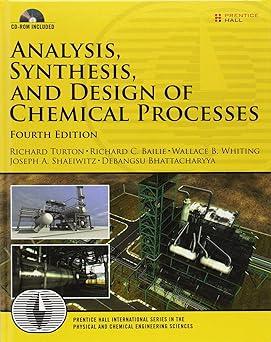The distillate stream from a distillation column (flowrate (35 mathrm{~m}^{3} / mathrm{h}), density of water) is recycled.
Question:
The distillate stream from a distillation column (flowrate \(35 \mathrm{~m}^{3} / \mathrm{h}\), density of water) is recycled. The destination of the recycle stream is a point \(3 \mathrm{~m}\) below the fluid level in the reflux drum. First, the recycle passes through a pump to supply sufficient head to overcome frictional losses \((20 \mathrm{kPa})\) and reach the pressure of the stream with which it is mixed \((250 \mathrm{kPa}\) above distillate stream). Then, it is heated from \(90^{\circ} \mathrm{C}\) to \(120^{\circ} \mathrm{C}\) using desuperheated low-pressure steam at \(140^{\circ} \mathrm{C}\). Assume that all resistance is on the process-stream side of the exchanger (tube side).
It is desired to scale up the entire plant capacity. It has been determined that the distillation column can be modified to maintain the recycle stream temperature at \(90^{\circ} \mathrm{C}\). It has also been determined that, with the required changes in the feed section of the process, the lowest allowable temperature of the recycle stream is \(119^{\circ} \mathrm{C}\) to satisfy liquid-phase reactor inlet conditions after mixing with fresh feed. Figure P24.21 is the pump curve for the pump in the recycle stream.
a. What is the maximum possible scale-up percentage based on the heat exchanger?
b. Can the pump handle the answer in Part (a)?
c. It is suggested that because a lower temperature of the recycle stream would reduce the reaction rate, if needed, the pumps in the feed section could be used to increase the reactor pressure, and hence the reaction rate. What is your opinion of this suggestion?
Step by Step Answer:

Analysis Synthesis And Design Of Chemical Processes
ISBN: 9780132618120
4th Edition
Authors: Richard Turton, Richard C. Bailie, Wallace B. Whiting, Joseph A. Shaeiwitz, Debangsu Bhattacharyya






